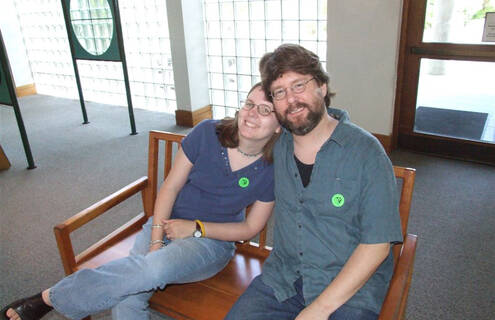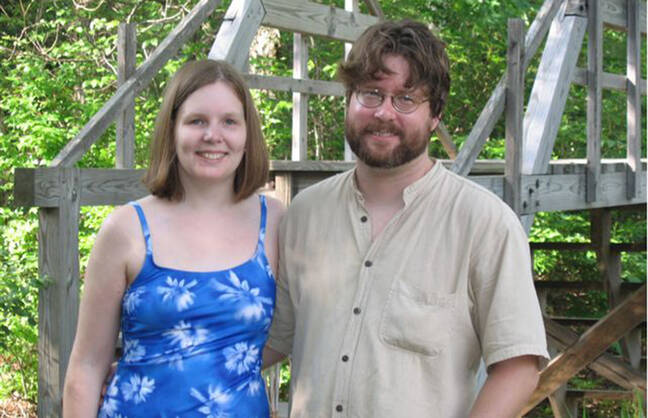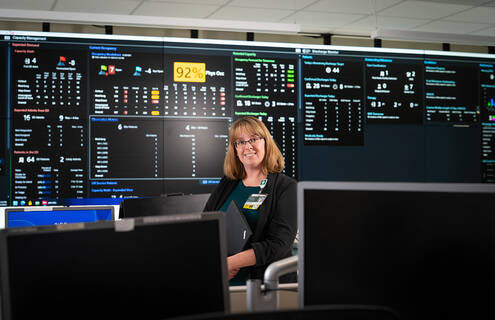
ConnectShareCare is about providing a space to be heard, about letting people know they're not alone, and that this is something that they can survive and that they will get through this with help.
JayMeredith and Jay had been together for 18 years. She died at 44-years-old from complications of treatment for brain cancer.
“She and I were soulmates,” writes Jay on the stories section of Dartmouth Health’s ConnectShareCare platform, which supports caregivers, individuals who have serious illnesses, and those who are grieving.
As one of Meredith’s caregivers and her long-time partner, Jay found a sense of solace and connection through the platform’s support group “Active Caring” and then through “Grief and Loss”. So valuable were both communities that Jay is now a volunteer mentor on the site.
“I am here to help,” explains Jay, who reviews the discussion board’s daily emails each morning because he knows how valuable showing understanding to someone who is struggling can be, whether because of illness or loss.
Why ConnectShareCare
Jay is one of hundreds of members who have benefited from the Dartmouth Health platform, which began as a chat forum for caregivers of people with serious illnesses.
Developed by a team that included care partners, people with serious illnesses, healthcare providers, and researchers from The Dartmouth Institute, the platform has grown to include a discussion board for people struggling with grief and one for Long Covid, the first of several planned for those with long-term illnesses.
The platform also now provides listings for in-person events, member stories, and crisis resources.
“ConnectShareCare is not about providing medical advice and treatment recommendations,” says Sandra L. Knowlton-Soho, RN, ConnectShareCare program manager in the Dartmouth Health Office of Care Experience. “It is about people with lived experience talking to each other about their own frustrations or what has—or has not—worked for them. It’s about people being able to say, ‘I'm so glad to have found a group of people that make me feel like I'm not so alone.’”
How it may help you
Coping with illness–your own or others–can be difficult and isolating, as can dealing with grief.
In fact, studies show that caregiving often results in chronic stress and can compromise a caregiver’s mental and physical health, leading to physical and psychological strain, as well as depression.
Grief, too, can have a debilitating impact on health, as can long-term illnesses like Long Covid.
But research also shows that online support groups, like those on ConnectShareCare, can help.
More specifically, studies suggest that online support groups can act as a buffer against the negative health impacts of caregiving and reduce the psychological distress that can come with grieving.
Emotional support has been shown to play an important role in helping to improve well-being and mitigate the distress of patients with Long Covid, too.
Connecting with people going through similar things
ConnectShareCare was started with the knowledge that connecting with people who understand just how you are struggling can be hard.
As Meredith grew increasingly ill, someone at The Jack Byrne Center for Palliative & Hospice Care recommended that Jay join the member site.
A self-described reserved person, Jay was initially not comfortable reaching out.
“I'd never done anything like that before, but ConnectShareCare was very helpful in moral support, good advice, and connecting me with people going through similar things,” Jay says. “I've now made a lot of friends, friends who have gone through similar things.”
Sometimes it's not much more than just saying, 'I know how you feel.'
It is now almost four years since Meredith passed and Jay still finds solace through talking about his feelings and experiences with the online ConnectShareCare community and through the in-person meetings he attends, thanks to the connections he has made through the platform.
In his role as a ConnectShareCare volunteer mentor, Jay also actively supports others, while remaining aware that each situation is unique, and that sometimes, when you are suffering, you just need to know that others are there for you.
“ConnectShareCare is about providing a space to be heard, about letting people know they're not alone and that this is something that they can survive—and that they will get through this with help. Sometimes it's not much more than just saying I know how you feel,” he says of his role as a volunteer mentor.
But Jay says ConnectShareCare is about more than that, too. It is about having a place where you can share stories, not just about yourself, but about those whom you love or have lost.
“She was quiet and reserved, caring and thoughtful. She loved crafting, especially making greeting cards and beaded jewelry. She loved to read and write poetry. She loved music and Herbal Tea,” Jay writes of his soulmate and the life they shared in his story, Meredith and Me
As with anyone’s grief, the pain in Jay’s story does not go away. “I will never stop loving her. I will never stop missing her,” he concludes. But for Jay and for so many others, ConnectShareCare remains the place where what is difficult is valued, understood and shared.
ConnectShareCare is administered by the Dartmouth Health Office of Care Experience and is part of the Promise Partnership Coproduction Learning Health System, a strategic partnership between the Dartmouth Institute at The Geisel School of Medicine and the Office of Care Experience in the Value Institute at Dartmouth Health.
To join or learn more about the free platform ConnectShareCare, become a member at https://connectsharecare.org/



